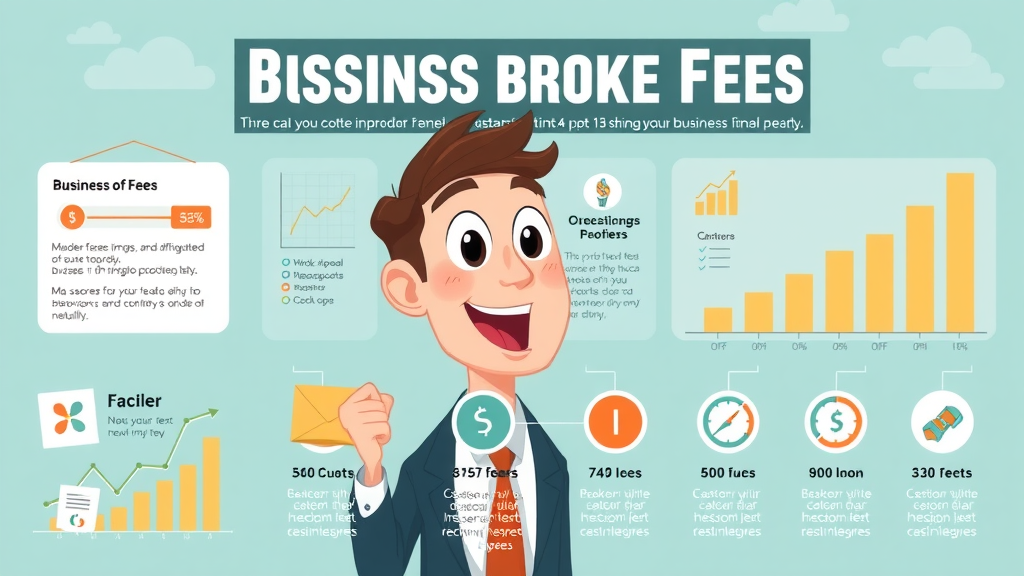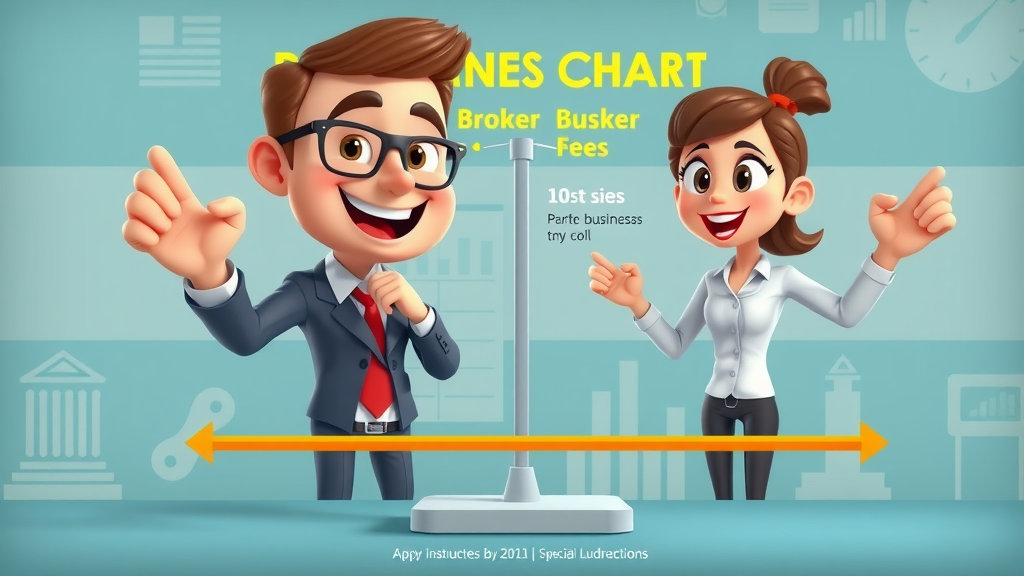Have you ever wondered if business broker fees are truly worth the cost, or if you're simply handing over a chunk of your sale for nothing? Selling a business is one of the most significant decisions any business owner can make. Yet, when broker fees start piling up, it’s easy to wonder: Are these costs genuinely justified—or could you be getting more value? This in-depth guide pulls back the curtain on business broker fees, unveiling industry secrets, essential negotiation tactics, and answers to the questions most business owners are too hesitant to ask. Read on before you list your business—you won’t want to overpay or leave money on the table.
- What business broker fees encompass and why they matter
- The difference between broker fee structures
- How to negotiate the best broker fee
- Common business broker fee pitfalls to avoid
- Industry averages for broker commission and fees
- Key questions to ask before you sell your business
Have You Wondered If Business Broker Fees Are Truly Justified? Discover the Hidden Truths Behind Business Broker Fees
Whether you’re preparing to sell your business for the first time or you’ve been through the process before, the world of business broker fees can feel overwhelming. It’s tempting to focus solely on the percentage brokers charge, but what you may not realize is that these fees are designed to align your broker’s interests directly with your own. Brokers not only connect you with the right potential buyers—they handle negotiations, paperwork, due diligence, and ensure confidentiality throughout the business sale process.
Yet, many business owners ask if the value matches the cost: How do brokers structure their fees? Are there hidden charges you should know about? What do industry benchmarks really tell you? This guide will walk you through the main types of broker fees, tips to avoid overpaying, and industry insights so you can confidently evaluate whether a broker’s fee structure is fair for your particular deal size and goals. Let’s get started with what these fees consist of at the most fundamental level.

Understanding Business Broker Fees: Basics Every Business Owner Should Know
Business broker fees are more than just a line item on your closing statement—they form the foundation of the broker’s compensation and incentives. Typically, brokers charge on a success-fee basis, meaning they only get paid when your business actually sells. But there are multiple components to these agreements. Knowing what each fee encompasses can save you thousands, if not tens of thousands of dollars, and prevent unwanted surprises down the line. Whether you own a small business or operate within a larger market, getting familiar with the industry’s baseline fee structure is crucial for a successful business sale.
Many business brokers will break their fee structures into categories like upfront fees , success fees (also called broker commissions), and possible add-ons like marketing or retainer fees. As a business owner, you should prioritize transparency so you can compare offers and fully understand the services and value you’re receiving for each fee. Let’s look at these key components of business broker fees, beginning with what they are and why they exist.
As you evaluate broker fee structures, it’s also helpful to understand how a broker’s expertise can directly impact your sale’s speed and outcome. For a closer look at how working with the right professional can accelerate your business sale, explore this guide on finding a business broker to sell your business quickly and efficiently .
What Are Business Broker Fees and Why Do Business Brokers Charge Them?
At their core, business broker fees are compensation for the suite of services provided during the sale of your business. Brokers operate as intermediaries, connecting sellers to qualified buyers, conducting marketing, vetting prospects, facilitating negotiation, managing due diligence, and keeping deals confidential—especially for small businesses where public knowledge of a sale can impact value. These tasks can be time-consuming and require specialized expertise in valuation, marketing, and contract negotiation.
Brokers charge these fees primarily to ensure their interests align with yours. The cornerstone is the success fee (or broker commission ), only earned once your sale closes. Other fees, like upfront or retainer fees, help compensate for the broker’s initial time investment and marketing outlays. When evaluating what a broker fee covers, keep in mind the broker’s ability to secure top-dollar price, maintain confidentiality, and streamline the selling process—all factors that can more than justify the investment when selling a business.

Core Elements of the Broker Fee: Success Fees, Upfront Fees, and Additional Charges
The typical broker fee structure for selling a business includes three main elements—each with specific purposes and timing. The first is the success fee , a percentage of the final sale price paid when the deal closes, incentivizing the broker to work towards the highest value transaction. The second is the upfront fee (sometimes called an engagement or listing fee), covering costs like valuing the business, preparing marketing materials, and advertising. These fees help ensure the broker is compensated for initial work, even if the sale takes longer or is unsuccessful.
Finally, you may see additional charges like marketing fees or monthly retainer fees , which cover promotional costs or ongoing advisory efforts. Transparency is key—reputable business brokers will provide an itemized agreement for any business broker commission or related charge. To make sense of common industry norms, let’s examine the most frequent types of business broker fees and their typical ranges:
| Fee Type | Description | Industry Range |
|---|---|---|
| Broker Commission | Fee after sale completion (success fee) | 5%–12%+ of sale price |
| Upfront Fee | Paid before business listing | $2,000–$20,000 |
| Retainer Fee | Monthly during engagement | $1,000–$5,000/month |
| Marketing Fee | Cost of advertising/listing | $500–$5,000 |
How Much Do Business Brokers Charge? Breaking Down Broker Fees and Commission
Understanding exactly how much business brokers charge arms you with knowledge to negotiate fair fees and maximize your net proceeds . Most business broker fees are contingency-based, so the broker receives a percentage of your business’s purchase price at closing. However, the specific amount varies based on deal size, industry, services provided, and whether you’re dealing with a flat or percentage-based structure. When reviewing contracts, always analyze not only the main commission, but also any scheduled or one-off additional fees that could impact your total payout after the business sale.
While comparing prospective business brokers, keep in mind that higher fees may reflect greater experience, service scope, or specialized market knowledge, while unusually lower fees might signal less commitment or fewer services included. Transparency and a clear fee schedule will ensure you’re not caught off guard at closing—let’s explore standard commission options and how they stack up against other pricing models.
Percentage of Sale: Standard Broker Commission for Selling a Business
The most common business broker fee is a percentage of the final sale price, often called a success fee or broker commission . For most small business transactions, this ranges between 8% to 12%, with larger deals often seeing percentages drop as the transaction size increases—a pricing approach similar to the “Lehman Formula” used in M&A and investment banking. For example, a $500,000 business sale may command an 11% broker fee, while a $10 million sale might be charged at 6%, reflecting both the size of the deal and the complexity of services offered at higher levels.
This structure directly aligns your broker’s incentives with your own, as they’re motivated to secure the highest possible sale price. Some brokers, particularly those experienced in selling businesses within challenging industries (like real estate or manufacturing), may offer tailored rates or tiered commissions for especially large or complex sales. Always ensure clarity on how these percentages are applied—whether the fee is based solely on the purchase price or includes other assets or receivables in the final calculation.

Flat Fees vs. Percentage-Based Broker Fees: Which Is Right When You Sell Your Business?
Many business brokers offer two main fee structures: the traditional percentage-based commission and the less common flat fee model. Percentage-based fees ensure the broker’s priorities align with yours—a win for sellers anticipating a robust sale price . In contrast, flat fees typically appeal to larger businesses or those with highly predictable valuations, where a broker may charge a defined amount regardless of final deal size. There are pros and cons to both models: flat fees offer predictability and may save costs on very large deals, but risk less motivation from the broker to push for premium purchase prices. Percentage structures, while variable, strongly incentivize your broker to maximize value and persevere through challenging negotiations.
As a business owner, your ideal approach depends on your expectations for deal size, business complexity, and the level of personal involvement you want from the brokerage team. Regardless of method, demand full transparency: get the entire fee structure and service outline in writing. This way, you’ll have a clear comparison between offers and can choose the fit that aligns with your goals for selling your business.
Upfront Fees and Hidden Costs to Watch for When Selling Your Business
While most of the broker’s compensation comes from the success fee , some charge upfront fees or retainers to cover preliminary costs. These usually pay for valuation, marketing material creation, or other out-of-pocket expenses the broker incurs before your business is officially listed. A reasonable upfront fee is between $2,000 and $20,000, depending on your business size and complexity. Watch for refundable stipulations; if the business doesn’t sell, clarify what portion you may recoup.
Business owners must also clarify what, if any, hidden fees or charges are associated with marketing, online advertising, or supplemental services. Insist that all fee types be itemized in the engagement agreement. If a broker is vague, pushes for unreasonably high upfront fees, or tacks on last-minute “minimum” or “due diligence” charges, consider it a warning sign. Avoid overpaying by staying vigilant when reviewing contracts and by engaging brokers who value open communication.
- Confirm broker fee structure in writing
- Validate what is included in the broker commission
- Clarify the policy on upfront fees
- Investigate additional marketing or retainer fees
- Assess if lower fees mean less service or experience
“A knowledgeable business broker turns their fee into a wise investment for your business sale, not just a cost.”
Success Fee Explained: How Business Broker Fee Structures Impact Your Payout
The success fee is at the heart of every quality business broker engagement. This fee, usually a percentage of the ultimate sale price , ensures your broker is fully motivated to not only close your deal, but secure terms advantageous to you. Understanding how this fee is calculated, paid, and benchmarked across the industry is essential for any business owner considering a broker’s services for selling a business.
Get the details of the success fee in writing: ask when it’s due, what triggers payment, and what the process is if a potential buyer backs out after contracts are signed. Read on to learn when the success fee is paid and how to evaluate if the proposed fee is in line with industry standards.
What Defines a Success Fee and When Is It Paid?
The success fee , often synonymous with the broker commission , is only paid when a business sale transaction successfully closes. It is usually based on the final purchase price agreed upon with the buyer. For most business brokers, this fee structure eliminates pay for unsuccessful efforts, which means the broker assumes significant risk upfront but is heavily incentivized to deliver results. For business owners , this fee arrangement minimizes the risk of incurring costs for failed sales while ensuring the broker remains motivated through negotiations and diligence.
This fee is paid out of escrow or at closing, once all deal terms are met and funds are transferred. If your business sale falls through due to a broker’s missteps or unvetted potential buyers, you should not owe a success fee. However, beware of fine print—some contracts stipulate a fee if you sell to a broker-introduced buyer after a certain period. Clarify timing and payment details with your broker to avoid disputes or unexpected costs.

Industry Benchmarks: What Is a Reasonable Success Fee for Business Brokers?
Industry benchmarks show that a reasonable success fee depends on your deal size, industry, and business complexity. According to M&A data, most business brokers charge:
| Business Sale Price | Typical Success Fee (%) |
|---|---|
| Under $1M | 10–12% |
| $1M–$5M | 8–10% |
| $5M–$10M | 6–8% |
These ranges reflect the reality that smaller businesses require similar, and sometimes greater, effort to market, qualify buyers, and close transactions—hence the higher percentages relative to large deals. Remember, if your transaction involves special circumstances (such as selling a real estate-heavy business or a regulated entity), your success fee may be subject to negotiation or unique benchmarks within that industry sector.
The True Value of Business Brokers: Are Broker Fees Worth Paying?
The most critical question for business owners is not “How much do brokers charge?” but rather “Do they deliver enough value to justify their fee?” Business broker fees are substantial, but a skilled broker can often realize a significantly higher sale price, vet more qualified buyers, and shorten time to closing—delivering a net benefit far exceeding their commission. The key is understanding what you actually receive for the fee and how experience impacts your deal outcome.
The real value comes from a broker’s marketing reach, buyer network, negotiation skills, and ability to handle tricky due diligence or regulatory requirements. Seasoned brokers also help you prepare for the process, avoid common pitfalls, protect confidentiality, and navigate issues as they arise. Done right, the broker’s fee isn’t just a cost but an investment to maximize your return—and your peace of mind—during a pivotal business transition.

What Services Are Included in a Business Broker Fee?
A comprehensive business broker fee typically covers a suite of services designed to streamline and maximize the sale process. Key inclusions often feature business valuation, preparation of marketing materials, widespread advertising, direct outreach to vetted buyers, management of confidential inquiries, coordination of due diligence, and negotiation of final terms. Some brokerages also include legal or accounting advisory, access to a proprietary network of buyers, and help with transfer of ownership documentation.
Transparent brokers disclose precisely what the commission covers and can provide examples or a service checklist. If you’re concerned about which services are bundled versus available as upcharges, ask your broker to clarify each line item. The best brokers tailor their approach to your business size, market, and unique needs—ensuring you’re never paying for “cookie-cutter” support.
How a Broker’s Experience Impacts the Fees and Final Business Sale Price
Not all business brokers are created equal. Those with extensive transaction histories, industry credentials, and a wide buyer network often deliver higher-value deals and command higher fees. This is not only due to the time spent but the expertise gained in negotiating with buyers, anticipating pitfalls, and positioning businesses for maximum appeal. When reviewing broker fee proposals, balance cost with value—sometimes paying a lower fee means sacrificing access to larger pools of buyers or best-in-class negotiation skills, ultimately yielding a lower final sale price or a longer sales cycle.
Request references, ask about closed transactions in your field, and review marketing examples. A transparent broker should welcome these questions and be willing to share both recent outcomes and a breakdown of their average deal size. If your goal is to sell your business quickly, confidentially, and for the best possible return, experience should weigh just as heavily in your decision as the fee percentage itself.
“A skilled business broker doesn’t just sell your business—they maximize your return and minimize your stress.”
Avoiding Overpayment: Red Flags in Broker Fee Structures
As with any professional service, some broker fee structures can favor the broker at your expense. Watch for unusually large upfront fees, non-refundable payments, or vague contract language around marketing and “minimum” fees. Red flags include promises of quick sales for suspiciously low commissions or brokers unwilling to outline all costs and inclusions before you sign. To effectively negotiate, you’ll need to recognize these warning signs and know how to advocate for your interests without alienating a quality professional.
Before you sign any agreement, compare offers from multiple business brokers, review online recommendations, and ask about any exception clauses or extra charges. Equipped with industry averages and benchmarks, you’ll be in a far stronger position to spot unfair fee structures and insist on a transparent, mutually beneficial deal.

Warning Signs of Unfair Broker Fees and How to Negotiate a Fair Broker Fee
Beware brokers who deflect direct questions about fees, offer only verbal quotes, or bundle vague retainer or minimum fee clauses into their contracts. Excessively high upfront fees without clear deliverables, non-refundable payments if the business doesn’t sell, or commissions out of line with industry standards (over 15% without justification) are all warning signs. Also question brokers who downplay the need for a written agreement—they may be hiding unfavorable terms.
To negotiate a fair business broker fee , ask each broker to outline their total compensation, including retainer, marketing, and success fees, as a flat dollar amount and as a percentage of several possible sale prices. Leverage industry benchmarks, and reference competing offers to strengthen your bargaining power. Last but not least, ensure your agreement outlines exactly when each fee is due, under which circumstances you owe nothing, and full details on what each payment covers.
Questions Every Business Owner Should Ask Before Agreeing to a Broker Fee
Before partnering with a broker, be sure to ask:
- What is your total fee breakdown, and what services does each part include?
- Are your upfront fees refundable if my business doesn’t sell?
- Can you provide examples of similar Recent Deals and associated fees?
- What’s your average time to close for businesses like mine?
- How do you source, screen, and qualify potential buyers?
- What happens if I find a buyer independently?
By clarifying these points, you can easily compare brokers, negotiate terms, and avoid misunderstandings—ensuring you pay a fair fee for measurable results.
- Compare multiple business brokers’ offers
- Leverage industry averages and benchmarks in negotiations
- Get all broker fees outlined before signing
Business Broker Fees for Different Deal Sizes and Types
Broker fee structures often flex based on deal size, business type, and industry. For small business sales—think main-street retail, professional services, or manufacturing companies under $1 million—brokers typically charge a higher commission percentage (10-12%), partly due to the time and marketing required to attract quality buyers. For large, complex transactions, including those involving significant assets, real estate, or specialized intellectual property, fees drop to 6-8%, but may include premium services like international buyer outreach, due diligence management, or custom marketing.
Your industry’s norms also matter: sales of real estate-heavy businesses, for example, can face real estate licensing fees or dual commissions. Whether you’re selling a mom-and-pop shop or a multi-location franchise, demand an itemized list from any broker detailing not just the percentage charged but also any minimum fee or fixed charges—they can add up quickly and eat into your proceeds if overlooked.

Small Business Sales: How Broker Fees Are Calculated
For the small business segment, business broker fees are usually calculated as a percent of the final purchase price, often including a minimum fee to account for the extensive marketing and time investment required to close these sales. The average success fee sits between 10% and 12% for businesses selling below $1 million. Costs like upfront or retainer fees may be bundled, with some brokers charging additional marketing or advertising expenses if extra promotion is needed to attract buyers.
Small business owners must be especially vigilant about minimum fee clauses that can apply even if the sale price falls below expectations. Always check if broker fees are calculated after adjusting for debt, inventory, or assets, as this directly impacts your take-home proceeds after closing. Even with higher percentages, an experienced broker’s strategic marketing, negotiation, and buyer screening can often add enough value to justify (or surpass) their commission.
Large Business Transactions: Broker Fee Variations and Premium Services
For transactions above $1 million, broker fees decline on a sliding scale—sometimes following versions of the “Lehman Formula” used in corporate finance, where the first $1 million of the sale commands the highest fee, with decreasing rates for subsequent millions. Complex sales may also include premium, a la carte services: international buyer search, legal or tax structuring, or niche industry marketing. These offerings, while potentially increasing costs, can expand your buyer pool, command a better price, and minimize regulatory or legal headaches during the transition.
Larger deals may also require custom retainer agreements or long-term engagement fees, particularly in regulated or competitive sectors like technology, healthcare, or real estate-heavy businesses. Demand a tailored fee proposal that reflects the complexity, anticipated listing length, and premium services relevant to your transaction.
| Industry | Typical Broker Fee |
|---|---|
| Retail | 10–12% |
| Manufacturing | 8–10% |
| Professional Services | 8–12% |
| Real Estate-Related | 6–8% |

- Estimate your expected sale price
- Calculate all broker fees and commissions
- Compare net proceeds with and without a broker’s services
- Weigh the added value—negotiation skills, time savings, higher price
Frequently Asked Questions About Business Broker Fees
No matter where you are in the sales process, questions about business broker fees are common. Here are answers to some of the most frequently asked questions by business owners considering a broker’s services:

What percent does a business broker charge?
Business brokers typically charge commissions ranging from 8% to 12% for small business sales, with lower percentages (down to 4-6%) for multimillion-dollar transactions. The rate depends on the size and complexity of the sale, the services the broker provides, and market norms in your region or industry.
What is a good broker fee?
A good broker fee falls within 8% to 12% for most deals, is clearly disclosed upfront, and is directly tied to the range of services offered. Look for brokers who offer advisory, marketing, due diligence, and negotiation support as part of the commission and avoid any agreements with vague or hidden charges not outlined in advance.
Is it worth using a business broker?
For most business owners , the answer is yes—an experienced broker can attract more qualified buyers, increase your net proceeds, manage the paperwork, and protect confidentiality throughout the process. Even after factoring in the broker fee, sellers often find they achieve a higher sale price and a smoother closing when using a professional intermediary.
What is the average broker fee for selling a business?
The average fee for selling a business is typically 8% to 10% of the final sale price , though this may change based on the type and value of your business as well as your region. Always compare multiple broker offers to ensure competitiveness and value for the services you need.
Expert Insights: Business Broker Fee Trends and What Business Owners Should Watch in 2024
This year, business broker fees are seeing new trends—brokers are offering more tailored service packages, greater transparency in fee breakdowns, and leveraging technology to reach broader buyer networks. However, inflation, sector-specific challenges, and increasing complexity in certain deals (especially those tied to real estate or intellectual property) mean that fee negotiations are more important than ever. Watch for sliding scale commissions, value-based pricing, and hybrid retainers as brokers aim to differentiate themselves while ensuring fairness and profitability for both parties.
As a business owner, stay proactive: ask about digital marketing strategies, expectations for buyer outreach in various industries, and how brokers plan to add value beyond basic listing and matchmaking services. 2024 will favor sellers who choose brokers not just for low fees, but for demonstrated results in similar transaction sizes and industries.

- Always get broker fee details in writing
- Compare commission rates and inclusions
- Account for both upfront and success fees
- Prioritize brokers with a track record of maximizing sale value
Before You Sell Your Business: Partner with the Right Business Broker for the Best Broker Fee
Don’t leave your business sale to chance. Choose a broker who is transparent about fees, negotiates in good faith, and has a proven track record of maximizing seller value—so every fee you pay is truly an investment in your business legacy.
Action Steps: Compare broker offers, demand full transparency, and partner with a broker whose experience translates into a higher sale price and a smoother transition. Every dollar counts—don’t overpay for peace of mind or results you can’t verify.
If you’re looking to deepen your understanding of how a business broker can elevate your small business sale, don’t miss our comprehensive resource on unlocking success with a business broker for your small business . This guide goes beyond fees, offering actionable strategies for choosing the right broker, preparing your business for market, and leveraging expert support to achieve the best possible outcome. Whether you’re just starting to consider a sale or ready to take the next step, these insights will help you maximize value and navigate the process with confidence.
 Add Row
Add Row  Add
Add 




Write A Comment